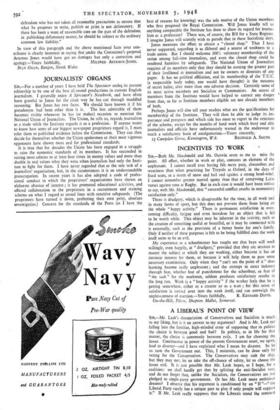JOURNALISTS' ORGANS
Sm,—For a number of years I have held The Spectator uncle; its present editorship to be one of the best all-round productions in current English journalism. I generally enjoy A Spectator's Notebook, and have often been grateful to Janus for the clean way he has cut through muddled reasoning. But Janus has two faces. We should have known it if his pseudonym had been other than it is. The less admirable of them becomes visible whenever he has (or makes) occasion to mention the National Union of Journalists. The Union, he tells us, regards journalism as a trade while the Institute regards it as a profession. If anyone wants to know how some of our biggest newspaper proprietors regard it, I must refer them to published evidence before the Commission. They can then decide for themselves whether the Union spokesmen or their most vigorous opponents have shown most zeal for professional standards.
It is true that for decades the Union has been engaged in a struggle to raise the economic standards of its members. It has succeeded in raising most salaries to at least four times in money values and more than double in real values what they were when journalists had only the Insti- tute to fight for them. I have never regarded that as the sole task of a journalists' organisation, but, in the cicumstances it is an understandable preoccupation. In recent years it has also adopted a code of profes- sional conduct in which the proprietors' organisations have shown an elaborate absence of interest ; it has promoted educational activities, and offered collaboration to the proprietors in a. recruitment and training scheme on what I regard as sound lines with sensitive safeguards. (The proprietors have turned it down, preferring their own petty, absolute sovereignties.) Concern for the standards of the Press (as I have the
best of reasons for knowing) was the sole motive of the Union members who first proposed the Royal Commission. Will Janus kindly tell us anything comparable the Institute has done to show its regard for journa- lism as a profession? There was, of course, the Bill for a State Register. I imagine Janus will scarcely wish to parade that in these Socialistic days.
Janus mentions the effort to obtain a "closed shop." That I have never supported, regarding it as illiberal and a source of weakness to a trade union. But I should welcome 100% voluntary membership of the union among full-time journalists, and even the closed shop could be rendered harmless by safeguards. The National Union of Journalists requires of its members only that they should be earning the greater part of their livelihood in journalism and not be owners or directors of any paper. It has no political affiliation, and its membership of the T.U.C. (a respectable body today, one would have thought) is the outcome of secret ballot, after more than one adverse decision. Certainly some of its most active members are Socialists or Communists. An access of members from the Institute would have helped to correct any danger from that, so far as Institute members eligible are not already members of both.
Perhaps Janus will also tell your readers what are the qualifications for membership of the Institute. They will then be able to judge its im- portance and prospects and which side has most to regret in the rejection of the scheme, except for the months of hard work which busy and able journalists and officials have unfortunately wasted in the endeavour to reach a satisfactory basis of amalgamation.—Yours sincerely,- r3 Cwnpden Grove,. Kensington, W.8. REGINALD A. SMITH.










































 Previous page
Previous page